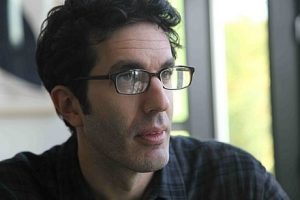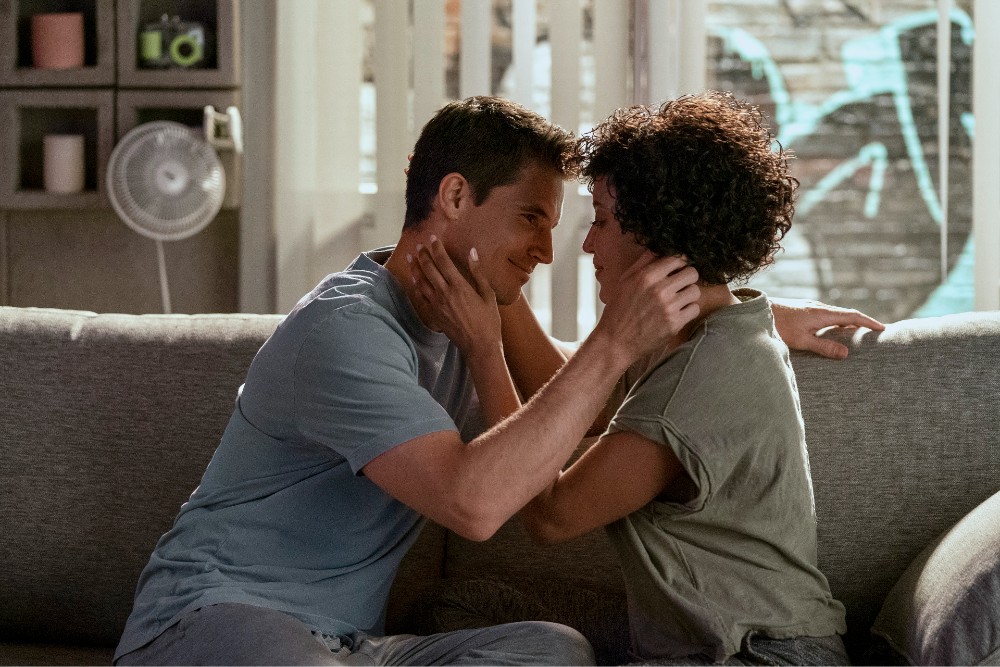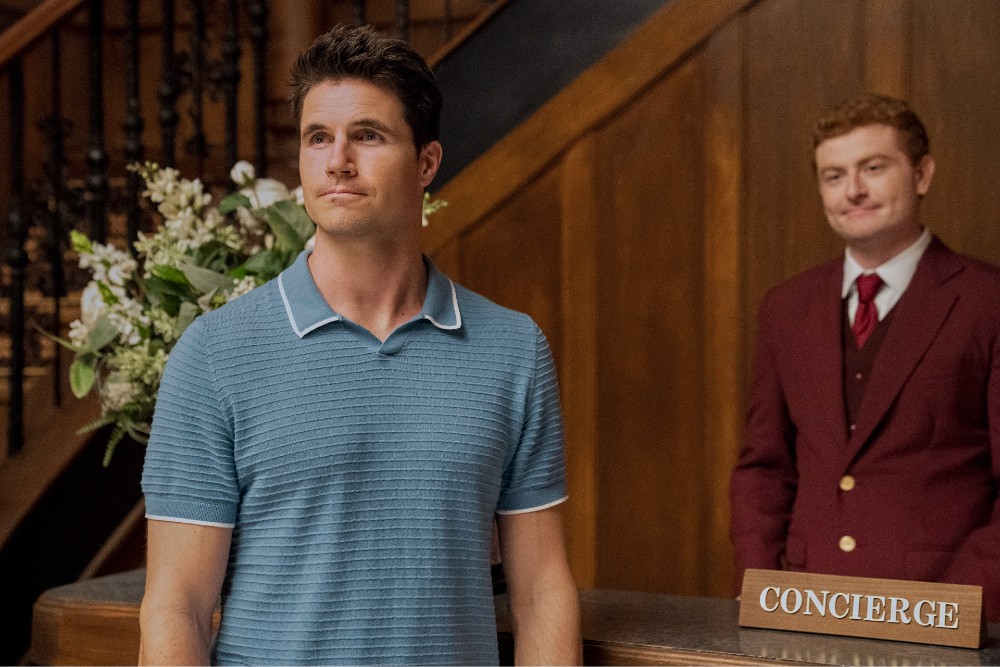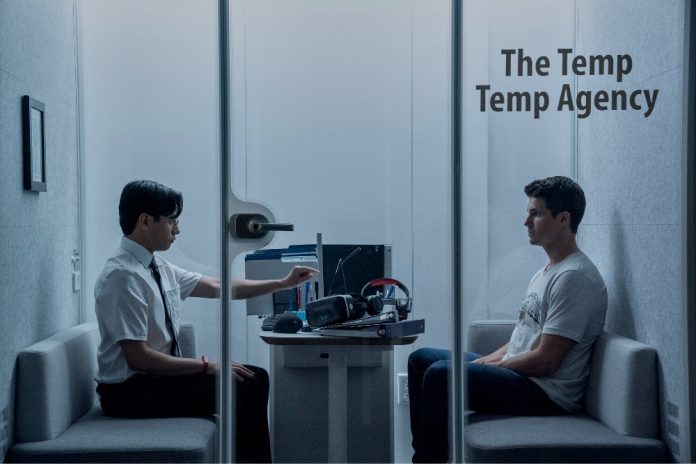Prime Video’s future-set series Upload returned for its third season on Friday, Oct. 20, continuing its depiction of a digital afterlife called Lakeview and the conditions that come with turning your memories over to a system that someone else owns and controls. The blend of sci-fi and comedy is just as good as ever, showcasing some important questions through an entertaining lens.
Above the Line had the chance to pose questions to Jeff Blitz, who returned to direct the first two episodes of Season Three, after helming one episode of Season One and several of Season Two. He touched on the intersection of the show’s futuristic technology and the comedy and romance that continue to anchor it.
He also revisited his comedy roots, including directing The Office and Parks and Recreation, as well as a less-known NBC series, Trial and Error, and hinted that he may soon return to the kind of fare that originally got him started and earned him an Oscar nomination: the world of documentary and film.

Above The Line: It’s been a year and a half since Season Two. Do you think anything has changed in the real world that makes this show’s world feel any more realistic?
Jeff Blitz: Upload seems like it often gets things right, or almost right, about the future. Maybe it’s how committed it is to showing the glitchy or sometimes even inadvertently dehumanizing part of future tech, but I’m often forwarding Greg news pieces about how something comical from Seasons One or Two suddenly seems to be edging toward reality. Sometimes it’s gloomy, but the fact that Upload got there first is at least a tiny consolation?
ATL: You directed the first two episodes of the season. What kind of tone do you think your episodes set for the rest of this season?
Blitz: Upload is a big pastiche of different genres. It’s a comedy first and foremost, but it’s also a work of sci-fi, a corporate espionage thriller, a romance, a mystery, a buddy story. It’s all that. I’m hoping Episodes One and Two re-introduce our audience to the specific tone of our show and get people excited about seeing more.
ATL: There are so many visual effects at play in this show and your episodes in particular, like a giant manufactured animal and all the technology of Lakeview. Is that a challenge to work with as a director?
Blitz: Of course, complicated VFX makes for a specific kind of directing and the planning is quite meticulous for that. But Upload is mostly an idiosyncratic comedy and it’s always my goal to prioritize genuine human emotion and character drama. The visions of the future are the dressing, they don’t change the basic humanity we’re trying to explore.
ATL: How does it work directing scenes with multiple AI Guys in them? I’m sure those are fun and somewhat difficult to create.
Blitz: That can be challenging – especially for Owen. Much of the time there’s several wardrobe and hair changes for him, which can make it hard to keep the comic and dramatic thread of the scene alive. But it helps that Owen is one of the writers, so he knows the deeper intentions of a scene, and of course there’s a lot of planning that goes into a sequence with multiple AI Guys.

ATL: It feels like romance is more central to this season, especially with Nathan and Nora. What has it been like to explore that side of the show?
Blitz: For me, the relationship between Nathan and Nora – and Back-Up and Ingrid – were the most fun thru-lines of the season. What are Nathan and Nora like now that a fantasy relationship is actualized – what is unexpectedly challenging for them? And what’s surprisingly better? And then there’s Ingrid and Back-Up… What will Ingrid do now that she gets another (undeserved, maybe) shot at love with (a version of) Nathan? Will she make it work or will her inner demons undo her shot at love yet again?
ATL: Do you have a preference for Lakeview or the real world in the scenes you direct?
Blitz: Maybe because both worlds are fantasies in their own ways, I find them equally pretty exciting to work in. Lakeview is obviously a full-on digital construction with rules that are wonderfully cartoonish at times, but the IRL world is 15 years in the future, and it has a lot of surprises too.
ATL: There are some really great series on your resumé. I want to start with Living with Yourself, since I think that show has some thematic connections to this one with the idea of cloning and whether it’s really ethical. Do you think the two are similar, and can you share any memories of working as an executive producer on that show?
Blitz: There’s special resonance between those shows now that there are two versions of Nathan, each exploring what it’s like to live their best life. But LWY starts from a kind of opposite premise: a guy who feels he’s failing the life he wanted and his clone who gets to try to remedy that. In Upload, Nathan is living large – or so he thinks – until he ends up at Lakeview in an untimely twist and has to make the best of it. By the time season three starts, Nathan is thrilled to be back in a flesh and blood body in the real world and Back-Up is happily living the Lakeview life. I’d also say that LWY felt to me like a show about mid-life in America and a wish to bust out of that depressing state of affairs, whereas Upload feels like a show whether it’s possible to defy death either through technology or, more plausibly, through human love.

ATL: I’m one of the few people who really liked Season One of Parks and Recreation, which got so big and popular after that. What was it like to be part of it and direct an episode before it caught on with audiences?
Blitz: It was really interesting to be there that early, when everyone was still figuring out the basic appeal of the show. I think it’s easy once a show becomes so comfortable in its own skin that it feels like it must’ve always known what it was, but in the case of P&R, it needed a few episodes to understand itself and get everyone on that same page. For me, it was always wonderfully funny – the people involved are just too brilliantly funny for it to go any other way – but the relationships at the core needed time to gel.
ATL: You directed a number of episodes of The Office, including “The Convict” and “Stress Relief.” What is it like to be part of the legacy of that series?
Blitz: The Office was the first TV show I ever directed on, and, even without any real frame of reference, I could sense I was into something special. I made the choice back then to not work on any other show (until Parks & Rec), because I just sensed it would never be as good as working with that bunch of writers and actors and crew. It’s not always that a job that feels special in the moment ends up working for audiences, but when it happens, it’s very special. The closest I’ve come since then was Review (on Comedy Central), which never broke wide but, among comedy world people, has found an adoring audience.
ATL: I have to ask about one show that I reference and recommend all the time which didn’t catch on nearly as much: Trial and Error. It feels like that show had to be a lot of fun. Can you share any memories of working on it?
Blitz: Thanks! Trial and Error was a joy from start to finish. To me, it was like if Mel Brooks made a mock doc show. Add to that John Lithgow and Kristin Chenoweth having the time of their lives and it was one we all hoped would find a wider audience than it did. I’m still on a giant text chain with the cast and we all continue to share memories and pray against all good sense that it comes back somehow someway.
ATL: Your first credit is for directing the Oscar-nominated documentary Spellbound. Do you have a desire to do more film and to get back to the nonfiction world?
Blitz: Stay turned on that front, please. Hope I’ll have something cool to share soon.



